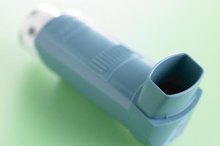What does fact checked mean?
At Healthfully, we strive to deliver objective content that is accurate and up-to-date. Our team periodically reviews articles in order to ensure content quality. The sources cited below consist of evidence from peer-reviewed journals, prominent medical organizations, academic associations, and government data.
- National Heart and Lung Blood Institute - Pneumonia
- National Heart and Lung Blood Institute - Pneumonia
- National Institutes of Health - Pneumonia
The information contained on this site is for informational purposes only, and should not be used as a substitute for the advice of a professional health care provider. Please check with the appropriate physician regarding health questions and concerns. Although we strive to deliver accurate and up-to-date information, no guarantee to that effect is made.
Signs & Symptoms of Relapse From Pneumonia
Bronchopneumonia, more commonly known as simply pneumonia, is an infection that causes inflammation of the lung. Pneumonia affects a large number of people 65 and older but can also impact infants and otherwise healthy adults.
If you are experiencing serious medical symptoms, seek emergency treatment immediately.
Causes
Viruses, fungi, parasites and bacteria are common causes of pneumonia, although most cases of the infection are caused by viruses and bacteria. Pneumonia can also be caused by the accidental inhaling of various substances into the lungs, such as liquid, vomit, food or liquids.
Symptoms
HIV & Stomach Symptoms
Learn More
Pneumonia fills the lung's alveoli with fluid, which prevents oxygen from efficiently reaching the bloodstream. The symptoms of pneumonia are caused by the body's reaction to the filling of the lungs and its effort to fight off the infection. According to the National Institutes of Health, the most common symptoms of pneumonia are cough with mucus, fever, shaking chills and shortness of breath 12. Other symptoms include:
- headaches
- excessive sweating
- stabbing chest pain
- fatigue
- loss of appetite
- confusion
- Pneumonia fills the lung's alveoli with fluid, which prevents oxygen from efficiently reaching the bloodstream.
- According to the National Institutes of Health, the most common symptoms of pneumonia are cough with mucus, fever, shaking chills and shortness of breath 1.
Treatment
For serious cases of pneumonia, when the patient is either over the age of 65, under the age of 2 or has another serious condition, such as heart disease, patients are usually admitted into a hospital. Hospital treatment consists of receiving fluids and antibiotics delivered through the veins, breathing treatments and oxygen therapy. Mild pneumonia in otherwise healthy individuals is generally treated with oral antibiotics on an outpatient basis.
Relapse Symptoms
Symptoms of Food in the Lungs
Learn More
According to the National Heart and Lung Blood Institute, you should see a doctor if you experience the following relapse symptoms of pneumonia 12:
-high fever -shaking chills -cough with phlegm that does not improve or worsens -shortness of breath with normal daily activities -chest pain when you breathe or cough -feel worse after a cold or the flu
Prevention
There are several factors that can increase your chances of getting pneumonia or experiencing a pneumonia relapse. According the National Institutes of Health, the following factors increase your risk of pneumonia 2:
-smoking cigarette -recent viral respiratory infection (cold, laryngitis, flu) -chronic lung disease (COPD, bronchiectasis, cystic fibrosis) -cerebral palsy -heart disease, liver cirrhosis, or diabetes mellitus -living in a nursing facility -impaired consciousness -surgery or trauma -immune system problem
Related Articles
References
- National Heart and Lung Blood Institute - Pneumonia
- National Institutes of Health - Pneumonia
- Almirall J, Serra-prat M, Bolíbar I, Balasso V. Risk factors for community-acquired pneumonia in adults: a systematic review of observational studies. Respiration. 2017;94(3):299-311. doi:10.1159/000479089
- Komiya K, Ishii H, Kadota J. Healthcare-associated Pneumonia and Aspiration Pneumonia. Aging Dis. 2014;6(1):27–37. doi:10.14336/AD.2014.0127
- Frantzeskaki F, Orfanos SE. Treating nosocomial pneumonia: what's new. ERJ Open Res. 2018;4(2):00058-2018. doi:10.1183/23120541.00058-2018
- American Lung Association. Pneumonia symptoms and diagnosis. Updated May 27, 2020.
- Morris DE, Cleary DW, Clarke SC. Secondary bacterial infections associated with influenza pandemics. Front Microbiol. 2017;8:1041. doi:10.3389/fmicb.2017.01041
- Chughtai M, Gwam CU, Mohamed N, et al. The epidemiology and risk factors for postoperative pneumonia. J Clin Med Res. 2017;9(6):466–475. doi:10.14740/jocmr3002w
- Garin N, Marti C, Scheffler M, Stirnemann J, Prendki V. Computed tomography scan contribution to the diagnosis of community-acquired pneumonia. Curr Opin Pulm Med. 2019;25(3):242–248. doi:10.1097/MCP.0000000000000567
- Mantero M, Tarsia P, Gramegna A, Henchi S, Vanoni N, Di Pasquale M. Antibiotic therapy, supportive treatment and management of immunomodulation-inflammation response in community acquired pneumonia: review of recommendations. Multidiscip Respir Med. 2017;12:26. doi:10.1186/s40248-017-0106-3
- Principi N, Esposito S. Prevention of community-acquired pneumonia with available Pneumococcal vaccines. Int J Mol Sci. 2016;18(1):30. doi:10.3390/ijms18010030
- Mayo Clinic Staff. Pneumonia. Mayo Clinic. Updated March 13, 2018.
- National Heart, Lung, and Blood Institute. Pneumonia. National Institutes of Health. U.S. Department of Health & Human Services.
Writer Bio
J. Mariah Brown is the owner and editor-in-chief of Writings by Design, a comprehensive business writing service company. She is a formally trained, seasoned journalist, and has worked in a variety of fields, which has equipped her with the experience needed to write and edit for an eclectic audience base on virtually any topic.








